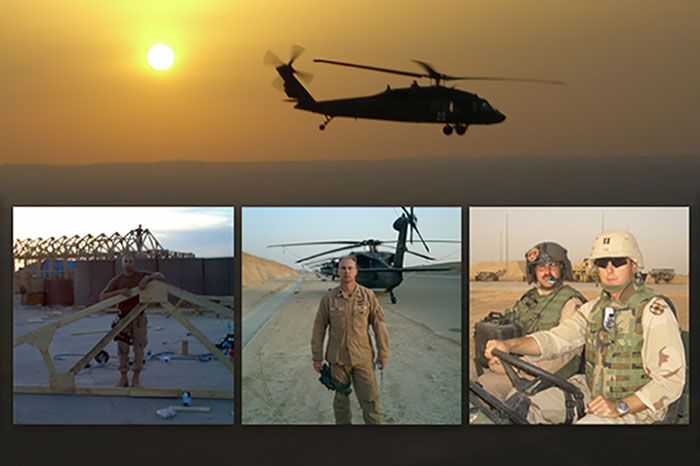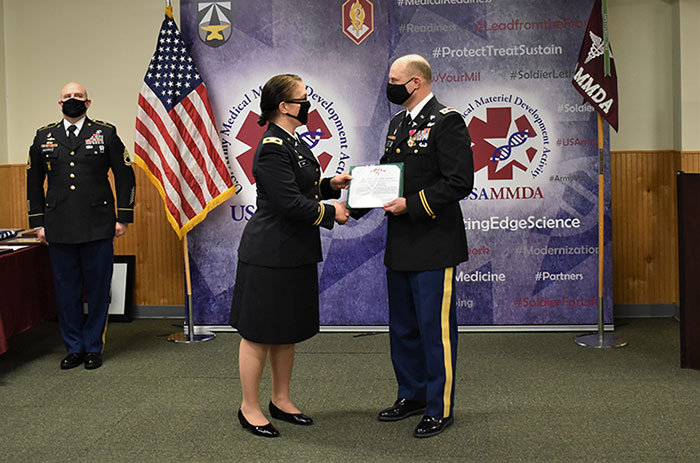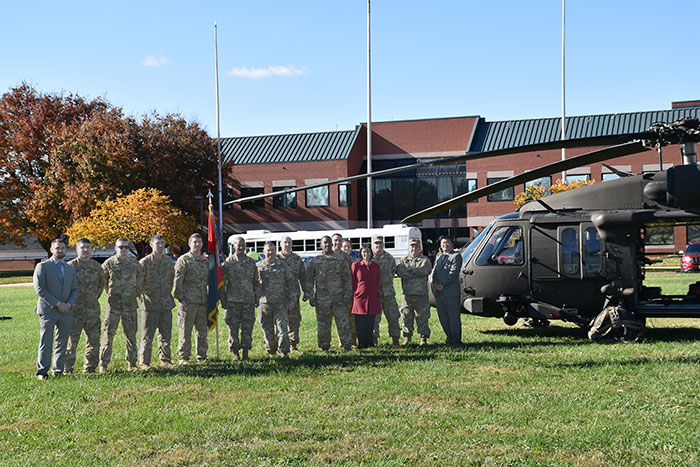LTC Christian Cook retires after nearly 30 years of service

How do you say farewell to a consummate Soldier who has served his country, and its citizens, for nearly three decades? Some may want pomp and circumstance, while others may ask only for a firm handshake, a crisp salute and a sincere "thank you." In the case of Army Lt. Col. Christian Cook, both of these certainly are warranted — along with quite a bit more. Cook, who currently serves as deputy project manager for the U.S. Army Medical Materiel Development Activity's Warfighter Health, Performance and Evacuation Project Management Office, will be retiring from active duty at the end of February, capping off a truly admirable military career.
Speaking with Cook, he recalls growing up in Springfield, Missouri, where his family had a large farm, and he remembers the three horses he kept there throughout his high school years. He loved to ride, and participated in several parades during his younger years. But more than horses, however, Cook took an early interest in airplanes and aeronautics. The attraction was so great, in fact, that his enthusiasm grew to a level that led him to pursue a career in aviation.
"I've always liked planes," he explained. "In 1987, I convinced my parents to take our summer vacation in Oshkosh, Wisconsin, to attend AirVenture, 'The world's largest air show and fly-in'. After that, I was hooked. I came home after vacation and mowed lawns to start paying towards my private pilot's license. I quickly saw the military as the venue to keep flying."
However, there's an interesting backstory to the military connection. You see, Cook's family, on both sides, has a long history of military service. His father and uncle were Marines who fought in Vietnam during the 1960s, and his mother's father served in World War I. Her three brothers also served, with two having retired after "full careers." Cook said one of these men was a tail-gunner on a B-24 bomber in World War II, afterwards serving in the Korean War as well as several tours in Vietnam.
In light of this, it seems inevitable that Cook would join the military, and thus he began his career in 1992 at the Army Airborne School, as a member of the 1105th Aviation Classification and Repair Depot in the Missouri Army National Guard.
"Many of my family members served in the military, so there was plenty of influence when I was young," said Cook. "Initially, I wanted to serve because of patriotism. Flying was fun, but a strong desire to serve Soldiers is what kept me going. Serving these men and women at the unit level and on missions soon transitioned to serving them on a much broader scale, through serious product development and the delivery of critical tools they needed for the fight."
Before Cook made the transition to serving other Warfighters, however, he had gained quite a bit of experience through numerous deployments, missions and training assignments. Between 1997 and 2013, he is credited with three combat tours as a UH-60 Blackhawk MEDEVAC pilot.

Cook was very clear in relating the various missions he flew, and he said many do not realize the harsh reality that comes with retrieving injured Warfighters from the battlefield. He explained that although MEDEVAC crew members may often wait for hours in "boredom" before a call to fly, the time spent in landing and onboarding casualties may be the "most horrific" few moments you could ever imagine. Cook and his team took on this great responsibility without hesitation, despite being under fire often — he recalled many times when they were hunkered down behind the seats, taking cover against the armor that saved their lives.
Going back to the beginning of his career, Cook completed U.S. Army Flight School training in 1999, then relocated to Fort Campbell, Kentucky, where he served in the 50th Medical Evacuation Company (Air Ambulance) in support of the 101st Airborne Division. After two deployments in support of Operation Iraqi Freedom, he served as Battalion Executive Officer and C Company Commander of the 291st Aviation Training Battalion, Fort Riley, Kansas.
The responsibility given to Cook early in his career surprised even himself, as he admitted, "Becoming a Pilot-in-Command of a $20 million UH-60 Blackhawk as a First Lieutenant with only 300 flight hours — I remember thinking that there was no way I would ever get to do this on the civilian side. You can't even get insurance for something like that unless you have 2000 hours. I feel very fortunate to have had that opportunity."
In 2011, Cook was assigned to command the Aviation Detachment, 1st Battalion, 223rd Aviation Regiment, 110th Aviation Brigade at Fort Rucker, Alabama, where he provided 24/7 crash rescue support of military trainees at the U.S. Army Aviation Center of Excellence, as well as support to the local civilian community through the Defense Support of Civilian Authorities program. Over his career, Cook transported approximately 1,700 critical and non-critical patients to medical treatment facilities, both military and civilian.
An ideal leader, Cook utilized his experience and unique skillset to help prepare other Service Members for duty. He provided expert training to numerous MEDEVAC crews, comprised of commissioned officers, warrant officers, flight medics and firefighters, while he concurrently attained Pilot-in-Command status of multiple MEDEVAC helicopters in day, night, and instrument conditions.
Army leadership quickly recognized Cook's broad knowledge of military aviation as a valuable asset, and this catapulted him into the world of acquisition, which began at the Program Executive Office — Aviation, where he focused on the modernization of the Army's aeromedical MEDEVAC fleet.

In 2014, he served as deputy commander for the U.S. Army Aeromedical Research Laboratory, Fort Rucker, a subordinate command of the U.S. Army Medical Research and Development Command, and in 2015, he became project manager for MEDEVAC Mission Equipment at the U.S. Army Medical Materiel Agency. In this role, which focused on the UH/HH-60 Blackhawk MEDEVAC, Cook was charged with upgrading the helicopter's medical interior based on lessons learned in Operations Iraqi Freedom and Enduring Freedom. He helped to identify a modernization package that included the Forward-Looking Infrared video system for the MEDEVAC in degraded conditions, the Blackhawk Advanced MEDEVAC window for paramedic visibility, and a litter rack system to support the expedited loading and treatment of multiple casualties.
With a Bachelor's degree in Civil Engineering and a Master's in Procurement and Acquisition, Cook's experience and insight have been instrumental throughout his career. As a Medical Service Corps officer and defense acquisition professional, he has been involved in enterprise and organizational development, logistics planning, and Department of Defense-level budgeting, while managing various product development teams. A work load such as this may keep many from enjoying their daily routine, or their teammates — but this isn't the case for Cook, and his colleagues will miss his knowledge, and his presence.
"Lt. Col. Cook provided the operational insight that is lacking in most civilians who haven't served in the military," said Steven Hawbecker, project manager of USAMMDA's WHPE PMO. "He was able to quickly dissect the medical nuances of the Army's Multi-Domain Operations concept, and convey these to the PMO staff. His real-world experience and ability to serve as a mentor for his subordinates have been vital to the growth of the WHPE PMO."
"Not only did Christian bring a wealth of knowledge on aeromedical evacuation and Army operations, he was also a great person to call on for help," he added. "More than once, he assisted team members with problems, ranging from car troubles to personal matters, and helped them however he could — which is certainly a true testament of his character as a Service Member. Our team will truly miss him."
Jay Wang serves as product manager of the WHPE PMO's Medical Hands-free Unified Broadcast system, or MEDHUB, team, which is supervised by Cook. Both are extremely proud of this innovative device, which is an electronic medical communications system designed to improve the way medics and hospitals share patient information, such as vital signs, injuries and treatments during medical evacuations.
Reflecting on their relationship, Wang said, "Lt. Col. Cook is a friend and mentor to me, and a valued member of the medical community — his leadership and connection to this large group will be sorely missed. He brought to our team an operational view and mentality, as a MEDEVAC pilot, which provided a sense of realism and unique understanding for our MEDHUB program to be successful in theater. We wish him well, and I know he will be successful in anything he does."
Looking towards his retirement, Cook says he's not in a hurry to do anything except spend more time with his wife, Christina, and their two teenage daughters, and "build a pillow fort in the living room." His long-range "to-do" list includes things such as hiking the entire Appalachian Trail, flying his collection of gas-powered radio-controlled airplanes with friends in his club group, restoring another vintage military vehicle (to accompany the 1968 M151 military jeep he already owns), and finding a beach house for the family to enjoy — perhaps sooner rather than later.
As he wraps up his amazing journey, Cook is quick to thank his family for their love and support.
"I couldn't have made it through all of these years without their flexibility and tolerance for my working late, overnight duty, weekend duty, TDYs [temporary duty travel], FTXs [field training exercises], on-call MEDEVAC duty, combat deployments, holidays, getting calls at all hours..." he said.
"Although we have relocated less than other Service Members I know, every move caused stress, with leaving friends and jobs, and packing and unpacking a full household," he continued. "But my wife always came through, and she made moving to each new home a truly positive experience for us. She quickly adapted to each new place, made friends quickly, and supported me more than I can ever thank her for. As she likes to say, 'every place is what you make it.'"
It seems a little of his wife's philosophy may have rubbed off on Cook, because he certainly made each of his military assignments better by his sincere enthusiasm and his passion for flying. Although he soon will head towards new skies, Cook's jet stream will remain visible for many years to come. Without question, he made a positive impression on those he worked with, and served as the catalyst for many positive changes in numerous processes and products for our military — and this is something that just won't fade away that quickly.
About USAMMDA
USAMMDA is a subordinate command of the U.S. Army Medical Research and Development Command, under the Army Futures Command. As the premier developer of world-class military medical capabilities, USAMMDA is responsible for developing and delivering critical products designed to protect and preserve the lives of Warfighters across the globe. USAMRDC is leading research to prevent, detect and treat COVID-19. USAMMDA is applying existing field-leading research capabilities, a global research network and established partnerships to support the Whole-of-Government response to COVID-19.












